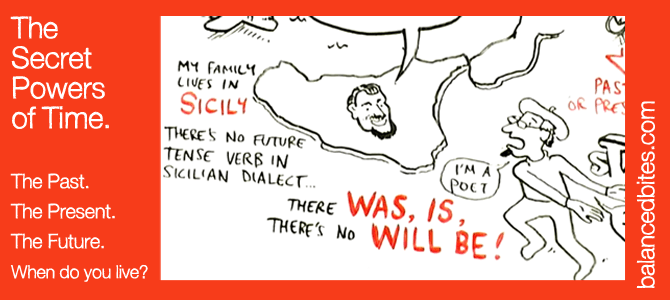
Monday Motivation: The Secret Powers of Time, and are you past, present, or future oriented?
If you’ve ever had a conversation, an argument, or other interaction with another person wherein you simply could not see eye-to-eye despite having the same basis of knowledge on the topic or issue at hand, you’ve likely discovered The Secret Powers of Time.
The Secret Powers of Time is a fantastic, short presentation by Philip Zimbardo, author of The Time Paradox: The New Psychology of Time That Will Change Your Life (I only just recently discovered that he’s written the book as well and can’t wait to read it!) that’s been gloriously animated by RSA.
Watch the video here first, then read on…
According to Zimbardo, there are six main “time zones” where people can live (with my own interpretations of some he didn’t completely explain in the video):
- Past Positive – you live with much consideration to the past because of the joy (the good old times) you experienced before and base decisions on what has happened before, not what is happening now or may happen in the future.
- Past Negative – you live with much consideration to the past because of negative things that happened that you fear will happen again; focusing on regret, failure, and things that have gone wrong – not considering what is happening now or may happen in the future; often based on historically negative views of what your life has been and perhaps having lived in the “present negative” at the time.
- Present Positive (Hedonistic) – you feel in control of your life and seek pleasure / move away from pain, which is normal, but you don’t have much care or consideration for what’s happened in the past, nor what may happen in the future.
- Present Negative (Fated) – you feel that it doesn’t pay to plan because life has been handed to you and is somewhat pre-determined (fated) by your religion, current level of wealth, socioeconomic status, etc.
- Future Positive – you trust in decisions about the future because you assume that what you choose now will pan out as expected.
- Future Negative – you don’t trust in decisions because you can’t assume that what you choose now will pan out as expected in the future.
Zimbardo explains how different countries tend to live in different mental time zones based often on religion and recommends a book called The Geography of Time if you want to learn more about time perspective. Interestingly, the way we measure how much time “expires” while we do various things in our day (waiting for an appointment, or standing in line, for example) is largely a function of whether your’re bored, excited, or otherwise. He says that you can even perform some simple experiments and observe the pace of life in different cities to determine the overarching “time zone” within which people there live. It’s quite an interesting concept, and I’ve noticed in my own life that my pace has slowed immensely, despite my hectic schedule of travel and work. I no longer feel the need to cram a million things into each day. I don’t have much that ever “needs” to be done at any specific time, other than (duh!) preparing for or showing up to teach or be present at an event. The reality is that I live very much in the Present. Of course I don’t forget the past and don’t ignore that there will be a future, but I honestly don’t dwell long on the thoughts of either. I find that it’s either paralyzing or ends up creating a less happy situation today. As grim as it may seem, I sort of live life with an attitude of “I could get hit by a bus tomorrow,” and then what? If all I ever think (ahem, worry?!) about is the future, of it I dwell in the past, I’d never be able to move forward without fear. The reality is that living at any other time than the Present actually becomes quite paralyzing for most people. They tend to sacrifice happiness today based on what either has been or what (they assume) will be.
Don’t get me wrong, clearly many people need to do some thinking ahead and be Future oriented to a degree. I get the sense that the minute a child enters the lives of parents, they instantly become a lot more Future oriented. This isn’t a bad thing, and I don’t want someone reading this to presume that’s my point. It’s simply worth noting that only living for the future may rob you of experiences today that will enrich your life and bring you joy.
I believe that we can live primarily in one “time zone” but also lean towards other as well. I also believe that we can easily change when we live by changing our thoughts consistently and creating a new self-dialog day-in and day-out.
Why do some people seem happier, while some constantly more distraught despite similar living conditions, jobs, level of wealth?
Why is it that some people never move forward with changes in their lives, despite knowing that change is inevitable while growth is an option?
Why are some people more inclined to take risks in their career versus find something steady and reliable?
Why do some people seem to take the ramifications of their decisions more seriously than others?
Why do children do things or touch things that they shouldn’t?
They don’t have a connection with the past or the future, they’re solely present-hedonists. They haven’t lived long enough to be anything else. As they get a bit older, they start to remember that a certain misbehavior led to a punishment or a prize, but until those habits are enforced, they don’t have any other time-basis for their thoughts.
Peter Pan Syndrome, anyone?
What about teenagers or adolescents? Why is it that they can sit in a classroom and learn the harmful effects of cigarettes, but still smoke when offered by a peer? Peter Pan was simply a Present Hedonist. Most adolescents are not future oriented, so the notion of developing a disease later in life as a result of their present action is irrelevant to them.
Understanding “when” someone lives can help you to either communicate better with them, or at least to understand their perspective and step back from an argument before it happens.
When do you live? Is it when you want to live? Or would you rather begin to shift your time perspective?
I would consider myself to live in the Present Positive, with an eye towards both the Past and the Future, not forgetting negative things that have happened, but not presuming that they will repeat themselves. I find that my Present Positive mindset and perspective actually shifts things, however small, on a daily basis in my life and things continue to happen in positive ways as a result. That said, I try not to live with too many expectations, so that I experience fewer negative emotional attachments. Sure, I have hopes, and some level of expectation is natural, but often it is in expectations (especially of other people without having clearly defined them ahead of time) that we experience disappointment. If you expect the person you’re interacting with to understand you without understanding “when” you live/think and “when” they live/think, you may find you’re fighting a losing battle.
Many of us can be in the same situation in a job or an everyday life-event, but it’s simply how we perceive what happens that determines many outcomes, positive or negative.
Have you experienced this in your interactions before? Do you recognize these time-oriented thought patterns in yourself?
I honestly believe that we continue to, on a daily basis, manifest our own destinies. We can’t always choose what happens in life, but we can choose how we perceive it. We can choose to take the information of the event in, process it, and use it to move forward in a way that helps us to feel most Present Positive. Even the worst situations, like losing a job, can be turned around if your attitude shifts. The loss of a job can either be devastatingly painful and upsetting, or viewed as the most grand opportunity to escape a previous life and start anew.
After reading Zimbardo’s book (when I get a minute to breathe!), I’ll likely write a follow-up post to this one. If you’re interested in reading it as well and having a chat about it book-club style in the future, let me know.




Jen says:
This sounds incredibly interesting and fascinating! I just got the Kindle version… but i may not have a chance to get to it right away, but i’ll try.
Thanks!
erika says:
Thank you for sharing this! I love your website!